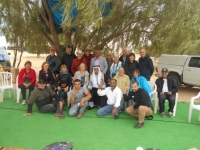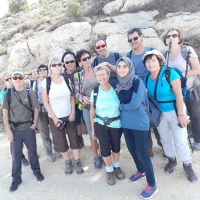Located 11 kilometers south of Jericho and 20 kilometers east of Jerusalem, Nabi Musa is a site in the eastern West Bank where Moses is said to be buried. In fact, Nabi Musa literally means ‘prophet Moses’. The first shrine marking Moses’ tomb was built by the Mamluk sultan Baibars al Bunduqdari in 1269, with with significant additions taking place between 1470 and 1480. In the early 19th century the Ottomans restored the buildings in Nabi Musa and promoted an annual pilgrimage and festival, wherein people walk from Jerusalem to Nabi Musa and enjoy three days of feasting, games, prayer and visits to the holy site before returning by foot to Jerusalem. The timing of the festivities corresponds with the Christian holiday of Easter: the Ottoman Turks wanted to give a reason for the Muslim population to celebrate at the same time as their Christian neighbors. The pilgrimage continued after the Ottoman collapse, taking place under the watchful eye of the British army. After taking control of the area in 1948, the Jordanian government suppressed the festivities out of fear that the procession would turn political. Nabi Musa has been under the control of the Palestinian National Authority since 1995. The area is home to a majority Muslim population.
According to the Torah, Moses’ tomb is located across the Jordan Valley on Mount Nebo, at a spot that can be seen from Nabi Musa.
Overnight
|
Type of Accommodation
|
Guesthouse
|
|
Name
|
Nabi Musa Guesthouse
|
If the Nabi Musa Guesthouse is not available you will be transferred back to Jericho for the overnight.
Notes
In villages it is important that you are dressed modestly at all times: this means wearing loose, opaque clothing that covers the shoulders and knees. Women should carry a lightweight scarf with which they can cover themselves when entering mosques or other holy sites.
Due to its Muslim population and rural setting, you will not be able to find alcohol in Nabi Musa.
While well-stocked pharmacies are easily accessible in much of the West Bank, you might not be able to find some desired medicines in small villages. For this reason, we recommend that you bring with you high SPF sunscreen, aspirin or other pain relievers, antihistamine, disinfectant, insect repellent, antibiotics and intestinal antiseptics. You should also have a hat, water bottle, backpack and comfortable shoes with you at all times to ensure your health and comfort while walking.





